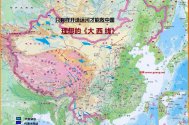That is true, it's why we see the Democrats in the US are playing into social justice and racial politics. They want to latch onto their future base. Demographics is one of the main reasons we see this chasm in current American politics. The left wants to go with the demographic trends to maintain cohesion in the society while the right wants to latch onto the idea of white America to maintain a homogenous homeland and cautious of long term consequences of heterogeneity. We hear this from the slogans of the more vocal ones who tend to be more expressive of their true feelings, like proud boys who chanted referencing their belief in the globalist plan to dilute them demographically.People who constantly bring up China demographics problem, conveniently forget that the us has worse demographic problem than China
Han Chinese will always be a majority in their own country, the same cannot be said about america, whites will be minority in around 2044
Without hispanic population growth, white america demographic actually is no better than China
They are declining and will be minority before half of this century
And american whites are not the kind that will ride away in sunset peacefully, their pride and arrogance won't allow it
Imagine the racial tensions and unrest that will happen when they become minority, trump is the primal scream of a declining white america
Traditionally when non-Americans hear of "America" they think of white Americans. Demographic reality is certainly changing. The compared to China's 37 in 2018.
Overall America does have fairly stable demographics. When broken down into racial groups we see a dichotomy. White America under went a baby bust while America as a whole did not. This top heavy population pyramid is very similar to Japan. Minorities like hispanic, black, and multi-racial groups follow a population pyramid that of mildly fast growing "3rd world" populations in the process of stabilizing. Corporations understand this and knows where their consumer base is trending towards thus makes financial sense to voice support in current racial issues. The political and capital class tends to be older and concentrated in the boomer and silent generations thus are disproportionally represented in areas of influence. .

China also faces demographic challenges. If we take a pure economic perspective, I don't believe demographic decline China is facing will result in negative economic growth in the next few decades.
@8:50 the speaker talks about China's education levels by age. It presents large room for development of secondary and post secondary education to increase its people's productivity. It would likely be a better approach to steer a sizable portion to different trades rather than the American system where large amounts of the population compete for college/university degrees resulting in high education costs and many going into non-productive majors.
The demographic dividend based around the number of heads is coming to a close in China. The new demographic dividend comes from the newly educated population with a focus around STEM fields capable of operating an advanced economy. This population is growing quickly and has room to grow for the next few decades.
I don't believe the retiring of the large older cohort will result in any economic collapse. Majority of older folk live in rural areas and small towns where cost of living is below average, they also don't have the lifestyle expectations that of the West. These people on average are much less productive in dollar terms compared to the younger generation that will replace them in the economy. Cities on the other hand are much younger and the supporting demographic factors will still last a few decades. Beyond that it becomes uncertain.
Cost of living in mega cities like Beijing and Shanghai are structurally high and negatively affects fertility as they are hyper competitive. They serve a function but a young worker might not want to stay their for the rest of their life. Dispersed development is favourable for fertility in a developed nation. In my view the development of new lands will become a needed solution. What I mean is the transformation of previously unfavourable land to be habitable. This can range from land reclamation like what is occurring in Shanghai at the mouth of Yangzte river or an extended South-North water diversion program that will bring water to the North and North Western deserts. For those that travelled to the deserts of South Western US, you would likely have seen kilometer diameter crop fields grown through circular irrigation. Deserts can become crop land if there is sufficient water. In Arizona it was done through the damming of the Colorado river, building canals to divert it from reaching Mexico in its original volume and towards other parts of the US. The same can be done in China. It will open up vast amounts of previously harsh regions. Making lands habitable also increases industrial land capacity. Workers won't live in mass in a place without water.

Last edited:

